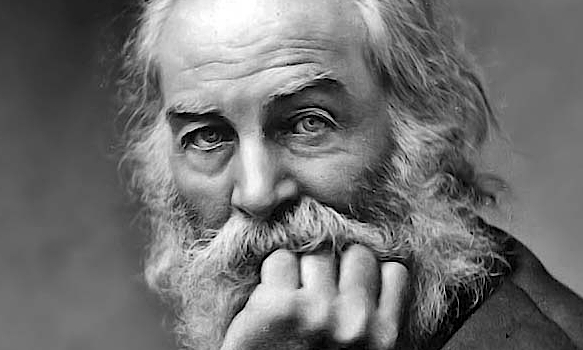Long Island University Post
Background
Hagen will work with the Long Island University Post Chorus, Mark Shapiro, conductor, during one of their regularly-scheduled rehearsals on A Walt Whitman Requiem. Learn more about the chorus here.
Hagen's extremely long and intimate relationship with choral singing has resulted in the creation of a large body of sophisticated choral works for professional and amateur ensembles. He was first introduced to choral singing by Wallace Tomcheck as a teenager, and was further immersed in it in high school, singing under the direction of Kay Hartzell; as an undergraduate at the University of Wisconsin-Madison he sang in Robert Fountain's chorus in performances of Bach's St. Matthew Passion, the Brahms Schicksalied, and the Beethoven Missa Solemnis.
Walt Whitman
About the Requiem
Two facts stand out about Hagen's Walt Whitman Requiem. It was, first of all, his first work fulfilled as a result of a commission. Composed during the summer of 1984 and completed on 19 May 1984 at Yaddo, in Saratoga Springs, New York, the piece was commissioned by the Loomis Chaffee School in Windsor, Connecticut and first performed by the Loomis Chaffee School Chorus and Orchestra on 10 May 1993 conducted by Mark Jon Gottschalk.
The requiem also happens to have had the longest gestational period of any of Hagen's compositions -- thirty-three years. Hagen asked Robert Schuneman, the publisher of the work (EC Schirmer, in Boston) to withdraw the work until he had a chance to revise it. In 1999, Michael Haithcock and a consortium of college bands commissioned a revised version, enabling Hagen to revisit the piece. At this point the "Trope: the Diary" was added, and the entire work reorchestrated. The resulting work (which was completed in New York City) was never performed, and Hagen again withdrew the piece until approached by Mark Lawson, who had acquired EC Schirmer and folded it into Morningstar Music, and asked to revisit it once more. After 33 years, Hagen returned to the piece, revising it for piano, mixed chorus, and soloist during summer 2017 in Rhinebeck, New York. He also executed an alternate orchestration for string orchestra at the same time. The final version was new-issued by EC Schirmer in September 2017.
Conductor Mark Shapiro
About Mark Shapiro
Versatile conductor Mark Shapiro is a true Renaissance spirit, equally at home with orchestras, choruses, and in opera, and as a lecturer, presenter and program annotator. He is unique among North American conductors for having won a prestigious ASCAP Programming Award five times, at the helm of three different ensembles.
Shapiro has been praised by the New York Times as an "insightful" conductor; The Times has also cited his work for its “virtuosity and assurance,” as well as its “uncommon polish." Shapiro's artistic vision has been characterized by the New Jersey Star-Ledger as “erudite and far-reaching.”
Shapiro is Music Director of the Prince Edward Island Symphony and of The Cecilia Chorus of New York, which performs an annual subscription series in Carnegie Hall, and Artistic Director of Cantori New York. He is an inaugural member of the Advisory Board of the Ann Stookey Fund for New Music. For two decades he led the Monmouth Civic Chorus (and Orchestra) in Red Bank, New Jersey.
Shapiro has appeared three times with Juilliard Vocal Arts, conducting Britten's The Rape of Lucretia, Poulenc's Les mamelles de Tiresias, and a double bill of Britten's Curlew River and Riders to the Sea by Vaughan-Williams.
Shapiro's other opera appearances include Bizet’s Les pecheurs de perles and Rossini's Barbiere di Siviglia with the Opera Company of Middlebury (VT), and Leonard Bernstein's Trouble in Tahiti and the staged premiere of Ben Yarmolinsky’s opera Clarence and Anita with Underworld Opera in New York. He has also conducted for American Opera Projects and the Center for Contemporary Opera at venues including The Cell and the Rubin Museum in New York.
As an orchestral conductor, Shapiro has led performances of standard repertoire with the Prince Edward Island Symphony and with the chamber orchestra Nova Sinfonia in Halifax, which he has frequently led as a guest conductor. He has conducted these ensembles in symphonies, concertos and other orchestral works by Beethoven, Berlioz, Brahms, Dvorak, Mahler, Mozart, Mussorgsky, Nielsen, Schubert, Schumann, Shostakovich, Sibelius, Tchaikovsky, Wagner and others. He led the Bridgeport Symphony in a concert featuring Metropolitan Opera soprano Harolyn Blackwell.
With the Prince Edward Island Symphony, Shapiro spearheaded a musical celebration of the 150th anniversary of the Charlottetown Conference, a founding event in Canada's history. The festive concert featured the world premieres of two significant works, one for orchestra, the other for voice and orchestra, by Canadian composers Garrett Krauss and Alice Ping-Yee Ho. Shapiro developed guidelines for the works -- for example, the orchestral work needed to build to and close with an audience sing-along of Canada's national anthem -- which were submitted in a nationally announced competition and chosen by a jury. Continue reading here.
Long Island University Post Choir
Additional Resources
- Read Hagen's article about composing the Walt Whitman Requiem, Composing and Gardening: How it Took Me 33 Years to Finish a Piece, here.
- Read an interview with Hagen about the Walt Whitman Requiem on ECS Publishing's Blog here.
- Learn more about the Long Island University Post Chorus here.
- Learn more about conductor Mark Shapiro here.
- Read a recent doctoral dissertaton on the choral music of Daron Hagen here.
- Peruse Hagen's choral catalogue here.



